|
Wayne
Cochran and the C.C. Riders
"Wayne Cochran and the C.C. Riders was
the best school of life and music that anyone
could ask for." - Allyn
Robinson 2012
Wayne's Roots
In 1971,
as an up and coming 20 year-old drummer from New
Orleans, Allyn landed the drum gig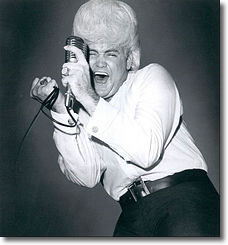 with the Cochran band and school was officially
in session. The rich legacy of this R&B
institution starts first and foremost with its
legendary namesake, Wayne Cochran. Born in
1939 in Thomaston Georgia, Wayne was raised in
the musically fertile region that produced the
likes of James Brown, Otis Redding and Little
Richard. Some say there must have been
something in the water, but truth be told, the
soul that emanated from this part of the country
was born of hard work, family and the fabric of
music than was ever present in their lives.
Wayne tapped a deep vein of soul with his band
and Allyn was an integral part of bringing that
to the stage every night.
with the Cochran band and school was officially
in session. The rich legacy of this R&B
institution starts first and foremost with its
legendary namesake, Wayne Cochran. Born in
1939 in Thomaston Georgia, Wayne was raised in
the musically fertile region that produced the
likes of James Brown, Otis Redding and Little
Richard. Some say there must have been
something in the water, but truth be told, the
soul that emanated from this part of the country
was born of hard work, family and the fabric of
music than was ever present in their lives.
Wayne tapped a deep vein of soul with his band
and Allyn was an integral part of bringing that
to the stage every night.
One needs to
go no farther than R&B pioneer Otis Redding for
Wayne's pedigree. Wayne moved to Macon
Georgia in the late '50s and achieved success as
a band leader, writer, vocalist and bassist.
In addition to recording several songs for local
labels Scottie, Gala, Confederate and Aire, he
played bass in a band called The Pinetoppers,
led by his good friend, Redding. Wayne
recorded bass on the classic frat song Shout
Bamalama with The Pinetoppers and also had
rights on another Redding classic, These Arms of
Mine. Even surprising to Wayne, Redding
noted that it was Cochran's original ten piece
C.C. Riders that were the inspiration for Otis'
own high-energy live show.
The
Birth of the C.C. Riders
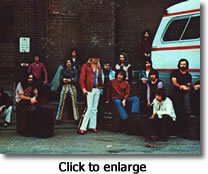 As
Wayne continued to form the vision for the C.C.
Riders (i.e. Cochran Circuit Riders), he was
greatly influenced by James Brown, the Godfather
of Soul. In fact, it was a song called The
Coo, recorded by Wayne on Scottie Records, that
got the attention of Brown's label, King
Records, and resulted in Wayne cutting several
records on the King label, including a
re-release of his greatest commercial success,
Last Kiss. Inspired by his labelmate and also
Johnny and Edgar Winter, Wayne started to
assemble a larger band and the C.C. Riders were
on their way. As
Wayne continued to form the vision for the C.C.
Riders (i.e. Cochran Circuit Riders), he was
greatly influenced by James Brown, the Godfather
of Soul. In fact, it was a song called The
Coo, recorded by Wayne on Scottie Records, that
got the attention of Brown's label, King
Records, and resulted in Wayne cutting several
records on the King label, including a
re-release of his greatest commercial success,
Last Kiss. Inspired by his labelmate and also
Johnny and Edgar Winter, Wayne started to
assemble a larger band and the C.C. Riders were
on their way.
Formed in 1963,
Wayne Cochran and the C.C. Riders had a 20+ year
run of high-energy performances that both
evolved with and influenced the music of the
time. Wayne rose through the 60s and
earned his place alongside some of music
greatest acts, playing venues ranging from The
Apollo to The Troubadour and all points in
between. Wayne influenced thousands of
musicians, including the likes of Elvis Presley
and his TCB Band as well as newcomers, Chicago,
Tower of Power and Blood, Sweat & Tears.
The Cochran Album
Having mastered and outgrown the Vegas scene of
the late-60s, Wayne signed with EPIC Records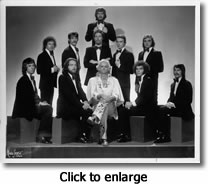 in 1971 and recorded the seminal album Cochran,
a transitional tour de force which saw the band
evolving from a large-than-life show band to a
harder edged R&B big band. In Allyn's own
words, "Wayne and Charlie (Brent) were looking to
form an R&B Big Band with more sophisticated
arrangements and voicings combined with that
greasy New Orleans groove." Allyn's
high-energy rhythm intensity was the perfect
match for this ground breaking soul band as is
clearly evident on the cut, "Somebodys' Been
Cutting On My Groove" from Cochran album, a
quintessential R&B Funk groove. The Riders
were a key piece in the evolutionary chain of
jazz, big band, R&B, funk and rock n roll, and
Allyn was fueling the charge to their new
horizon.
in 1971 and recorded the seminal album Cochran,
a transitional tour de force which saw the band
evolving from a large-than-life show band to a
harder edged R&B big band. In Allyn's own
words, "Wayne and Charlie (Brent) were looking to
form an R&B Big Band with more sophisticated
arrangements and voicings combined with that
greasy New Orleans groove." Allyn's
high-energy rhythm intensity was the perfect
match for this ground breaking soul band as is
clearly evident on the cut, "Somebodys' Been
Cutting On My Groove" from Cochran album, a
quintessential R&B Funk groove. The Riders
were a key piece in the evolutionary chain of
jazz, big band, R&B, funk and rock n roll, and
Allyn was fueling the charge to their new
horizon.
Robinson On Board
Allyn joined Cochran at a highly
transitional time. Only with the band for
a few weeks, Allyn found himself in the drum
chair for a classic concert at the Fillmore West
in April 1971. Not long after, Allyn was
in Columbia Studios in San Francisco recording
the Cochran album. Life was flying and
Allyn was soaking it in. Anyone who
witnessed the C.C. Riders in the '70s had a
permanent imprint placed on their soul, with
Allyn's stamp at the bottom. As Allyn
often states, "It was sink or swim and NO
excuses, that was it, period. Get it right
or go home with your tail between your legs."�
During his tenure with Wayne Cochran
(1971-1974), Allyn played with many great
players, including Charles Brent, Red Rodney,
Lee Thornburg, Al Silvestri and the legendary
electric bassist, Jaco Pastorius. It was
the gig of a lifetime and set the stage for
Allyn's stellar career as a rhythm ace.
Click here
to read more about Allyn's relationship with
Jaco.
Luther Kent
(with Trick Bag and The Forever Fabulous
Chickenhawks)
"Big Luther
Kent is the Prince of Bourbon Street and an
undisputed Louisiana legend."�
- Chickenhawks
Website
Trick Bag
In 1978,
Luther Kent teamed up with Charlie
Brent, former musical director for Wayne
Cochran.
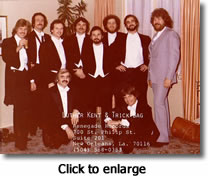 They formed a large New Orleans horn band which
became known as "Luther
Kent & Trick Bag." Allyn,
David Lee Watson and several Cochran alums
rounded out the line-up which took up residency
at the Old Absinthe House Bar on Bourbon Street.
In addition to their house gig at the Absinthe,
they also played The Blues Saloon, Crazy
Shirley's and The Risin' Sun (Luther's Club).
Trick Bag has released three CDs over the years and
is a regular at the New Orleans Jazz & Heritage
Festival where they have played 36 years in a
row.
They formed a large New Orleans horn band which
became known as "Luther
Kent & Trick Bag." Allyn,
David Lee Watson and several Cochran alums
rounded out the line-up which took up residency
at the Old Absinthe House Bar on Bourbon Street.
In addition to their house gig at the Absinthe,
they also played The Blues Saloon, Crazy
Shirley's and The Risin' Sun (Luther's Club).
Trick Bag has released three CDs over the years and
is a regular at the New Orleans Jazz & Heritage
Festival where they have played 36 years in a
row.
Trick Bag became "the" after-hours
band for many named artists to sit in with,
whenever they were visiting New Orleans.
Some of these artists included big names such as
Boz Scaggs, B.B. King, Bobby Blue Bland, Slim
Harpo, Jimmy Page, Bonnie Bramlett, Greg Allman,
Etta James, Joe Cocker, Stevie Winwood, Bo
Diddley, Dr. John, Rita Coolidge, Righteous
Brothers, Ike & Tina Turner, Wilson Pickett, ZZ
Top, Rickie Lee Jones, Mick Fleetwood, Billy
Preston, Ernie K-Doe, Mike Post, Average White
Band, Al Hirt, Billy Eckstein and Pete Fountain.
In 2012, Trick Bag is going strong with an
outstanding performance at the 2012 New Orleans
Jazz and Heritage Festival. The
standing-room-only crowd was electrified as
Luther and the big band worked their way through
a high-energy set, topped off with a guest
appearance from Allen Toussaint on "Let The Good
Times Roll." When it comes to genuine New
Orleans music, it does not get any better!
The Forever Fabulous Chickenhawks
Founded in 1980, The Forever Fabulous
Chickenhawks Showband and All-Star Review is
perhaps the last and the best of an endangered
breed, a 16-piece soul-blues-R&B powerhouse band
plus horn-section. Just like those that
used to back up the stars on the classic soul
revue shows of the '60s and '70s. The Hawks
features Luther and a staggering lineup of
musicians, including saxophone player Blue Lou
Marini, of the original Blues Brothers Band, Jon
Smith and Steve Howard of the White Trash Horns
(made famous by their stint with Edgar Winter's
White Trash), and guitarist "Cadillac"� Jack
Calmes and Rich "Soul Man"� Kinney.
Two
releases with the multitalented Texas/Louisiana
based band know as "The Chicken Hawks" under the
leadership of Jack Calmes featuring such greats
as Al "TNT" Braggs and the "White Trash" horn
section. The latest CD just released on
Red Hot Records is titled, "Luther Kent "Down In
New Orleans".
Luther
Kent - The
Artist
In 1948, Luther Kent was
born Kent Rowell in New Orleans, Louisiana. As a
vocalist, he was influenced by artists such as
Bobby Bland, Etta James, and Ray Charles. Kent
began to sing professionally when he was 14, and
his first record was released by Montel Records.
In 1970, he became the lead singer for a group
named Cold Grits and joined the legendary Blood
Sweat & Tears in 1974. Kent is known for a
big soulful voice and his big horn-based bands
that mix swinging blues with New Orleans R&B.
He is the Prince of Bourbon Street and an
undisputed Louisiana legend. His voice is
like no other and musicians of every discipline
from jazz to heavy metal go to great lengths to
see him perform. His big band has headlined the
Jazz Festival from its inception and when he
plays New Orleans, the shows are always sold
out.
Dr. Hook,
featuring Ray Sawyer
"Dr. Hook had 10 Top 40 Hits.
The music was great and the musicianship was
first class."
- Allyn Robinson
House Gigs Have Their Advantages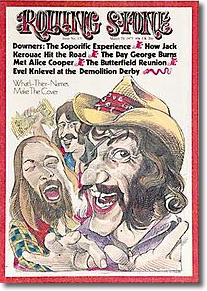
Luther Kent & Trick Bag were the house band
at The Old Absinthe House Bar and several other
legendary venues where they were one of the most
popular acts in New Orleans, especially for
musicians who were passing through town.
One such late-night hang was with Ray Sawyer of
Dr. Hook, who used several Trick Bag members for
some studio work and took a strong liking to
Allyn's playing. As a result, in 1990, Ray
offered Allyn the drum chair for several
European and Australian tours with the Dr. Hook
band. Since Allyn had stayed local for
most of the 1980s to focus on raising his
family, this was a nice chance get back on the
big stage with an international pop touring act.
It was a great choice as the tours produced some
great music and several long-lasting friendships
for Allyn. As Allyn notes, "Dr. Hook had
10 Top 40 Hits. The music was great and
the musicianship was first class."
Dr. Hook & The Medicine Show
Dr. Hook & The Medicine Show's sardonic,
country-flavored pop/rock made them one of the
most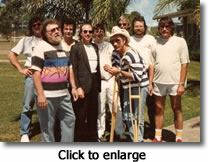 fondly remembered acts of AM pop radio's heyday
in the '70s. The band was formed in Union
City, NJ, in 1968, when a young
singer/songwriter named Dennis Locorriere teamed
up with Alabama-born country-rocker Ray
Sawyer. Sawyer's distinctive
stage presence stemmed from his enormous cowboy
hat and an eye patch that hid injuries from a
serious car accident in 1967. Sawyer'ss
eye patch inspired the nickname Dr.
Hook, after the Captain Hook
character in Peter Pan; with the rest of the
band christened the
Medicine Show.
fondly remembered acts of AM pop radio's heyday
in the '70s. The band was formed in Union
City, NJ, in 1968, when a young
singer/songwriter named Dennis Locorriere teamed
up with Alabama-born country-rocker Ray
Sawyer. Sawyer's distinctive
stage presence stemmed from his enormous cowboy
hat and an eye patch that hid injuries from a
serious car accident in 1967. Sawyer'ss
eye patch inspired the nickname Dr.
Hook, after the Captain Hook
character in Peter Pan; with the rest of the
band christened the
Medicine Show.
Their self-titled debut album, Dr. Hook & the
Medicine Show was released in 1971. The single
"Sylvia's Mother, became the band's first
million-seller and hit the Top Five in the
summer of 1972. Perhaps their most famous
hit, The Cover of Rolling Stone, became another
Top Ten smash in early 1973, and Rolling Stone
soon granted the band's wish. After
declaring bankruptcy to get out of their
contract with CBS records, they reemerged as Dr.
Hook and signed with Capitol in 1975. A
cover of Sam
Cooke's "Only Sixteen" returned
them to the Top Ten in 1976 and revitalized
their career. Further hits followed over
the next few years in "A Little Bit More,"
"Sharing the Night Together," "When You're in
Love With a Woman," and "Sexy Eyes."
Tab Benoit
"Allyn Robinson was a previous drummer in my
band. He's one of the rare New Orleans drummers
who knows how to play a blues shuffle. In fact
B.B. King told him so and loved his groove.
That's why he's a perfect fit for big bands like
the ones Luther Kent has. It's a perfect match.
Allyn learned a lot from when he was with Wayne
Cochran too. He also had a deep relationship
with Jaco Pastorius. Jaco's replacement in
Cochran's band was the bassist David Lee Watson.
Allyn and David Lee were with me for a long
time."
- Tab Benoit,
Interview by Bob Putignano in AlternateRoot
Magazine April 2012
In
1994, Allyn was looking to get back on tour when
a young blues guitarist and vocalist named Tab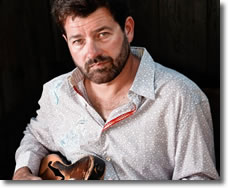 Benoit stopped by his house gig for a jam
session. Together with bassist Doug
Therrien, the chemistry with Tab was immediate.
Allyn and Doug soon joined Tab's band which led
to a very productive six-year stint, from
1994-2000 (with David Lee Watson joining on bass
in 1998). The partnership proved fruitful as
they recorded three CDs along the way, Standing
on the Bank (1995), Live: Swampland Jam (1997),
and These Blues Are All Mine (1999). The
combination of Allyn's greasy blues shuffles and
R&B funk grooves was the perfect foundation for
Tab and his brand of Cajun-influenced blues.
Benoit stopped by his house gig for a jam
session. Together with bassist Doug
Therrien, the chemistry with Tab was immediate.
Allyn and Doug soon joined Tab's band which led
to a very productive six-year stint, from
1994-2000 (with David Lee Watson joining on bass
in 1998). The partnership proved fruitful as
they recorded three CDs along the way, Standing
on the Bank (1995), Live: Swampland Jam (1997),
and These Blues Are All Mine (1999). The
combination of Allyn's greasy blues shuffles and
R&B funk grooves was the perfect foundation for
Tab and his brand of Cajun-influenced blues.
Guitarist, singer, and songwriter Tab
Benoit makes his home near New
Orleans in Houma, Louisiana. Born November 17,
1967, he's one of a handful of bright rising
stars on the modern blues scene. For most of the
1990s and into the 2000s, he's worked each of
his records the old-fashioned way, by playing
anywhere and everywhere he and his band can
play. Unlike so many others before him, Benoit
understands that blues is not a medium in favor
with 50,000-watt commercial rock radio stations,
so as a consequence, he's combined each of his
releases with as many shows as he can possibly
play.
Tab has been compared to
the likes of Albert King, Albert Collins, and Jimi
Hendrix. Although the
hard-working, modest guitarist scoffs at those
comparisons, and doesn't think he sounds like
them (and doesn't try to sound like them,
either), Benoit doesn't appear to be one who's
easily led into playing rock & roll instead of
his down-home blend of swamp blues and East
Texas guitar-driven blues. Tab has been
the standard bearer for a new generation of
Cajun blues musicians - a traditionalist and an
innovator at the same time, grafting elements of
rock and soul to the indigenous sounds of the
bayou.
Click here
to return to the top of the page.
|